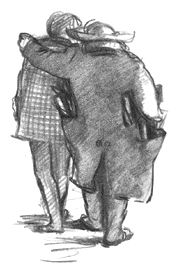Vie de Boheme – how the Bohemian Club was formed

16 of 24
(Part 16 of 24)
The story so far … Artist and musician Alexandre Schaunard has been thrown out of his room for non-payment of rent and has been traipsing the streets of Paris, searching for anyone from whom he can borrow a few francs. Hunger drives him at last to a cheap eating house, where he falls into conversation with a philosopher and man of books, Gustave Colline, who earns his living giving lessons in mathematics and various sciences ending in ‘ics’. Now read on …
The small sums that he earned by this kind of of bear-leading, Colline spent on buying old books. His nut-coloured coat was known to all the stall-holders on the riverside, from the Pont de la Concorde to the Pont Saint-Michel. What he did with all these books – more of them than a man could read in his lifetime – nobody knew, least of all himself. But the itch has assumed with him the nature of a passion; and, if he returned at night to his lodging without a new acquisition, he would say, in the words of Titus: ‘I have wasted my day.’ His pleasant manners, his language, which was a mosaic of all known styles, and the appalling puns with which he studded his conversation, overwhelmed Schaunard, who without further ado, asked Colline’s leave to add his name to those on the famous list we have already mentioned.
They left Mother Cadet’s at nine o’clock in the evening, both passably tipsy and with the carriage of men who have held lengthy dialogue with the bottle.
Colline invited Schaunard to drink coffee with him, and the latter accepted on condition that he might pay for the accompanying alcohol. They ascended to a café on the Rue Saint-Germain l’Auxerrois, bearing the sign-board of Momus, god of sport and laughter.
As they entered, a lively discussion had broken out between two customers. One of these was a young man whose face could hardly be seen for a huge, bushy, many-coloured beard. To set off this prognathic hirsutism, a premature baldness had stripped his temples as bare as a knee. A cluster of hairs, so few as to be almost countable, vainly endeavoured to conceal this nakedness. He wore a black jacket with tonsured elbows, which allowed a glimpse, when he raised an arm unduly, or airholes at the places where it debouched into the sleeves. His trousers were perhaps black; but his boots, which had never been new, seemed to have already made several world tours on the feet of the wandering Jew.
Schaunard noticed that his new friend Colline and the young man with the heavy beard exchanged greetings. “You know that gentlemen?” he asked the philosopher.
“Not intimately,” said Colline. “I meet him sometimes at the Library. I believe he is a man of letters.”
“He’s dressed like it, at any rate.”
The person with whom the young man with the beard was engaged in controversy was about forty years of age, and destined to die of apoplexy, to judge by a large head which entered his body directly between his shoulders, without an intervening neck. All the signs of the cretin could be read on his narrow forehead, which supported a small black smoking cap. His name was M. Mouton, and he was a clerk at the Town Hall of the 4th District, where he kept the register of deaths.
“Monsieur Rodolphe!” he shouted in a eunuch’s voice, shaking the young, bearded man, whom he grasped by a coat-button, “would you care to hear my view? It’s this: all the newspapers, they’re all worthless. Just to illustrate my meaning: me, I’m the father of a family, aren’t I? Well, then … I come to the café to play dominoes … Pay close attention to my train of thought.”
“Proceed, then, proceed,” said Rodolphe. (To be continued)
“ Vie de Bohème by Henry Mürger, a vivid portrait of the ‘Bohemian’ life of the artistic quarter of Paris in the nineteenth century was originally published (by Michel Lévy) in 1851. The extract above is taken from a translation by Norman Cameron, published by Hamish Hamilton. The illustration is by Dodi Masterman.
Leave a Response
You must be logged in to post a comment.

